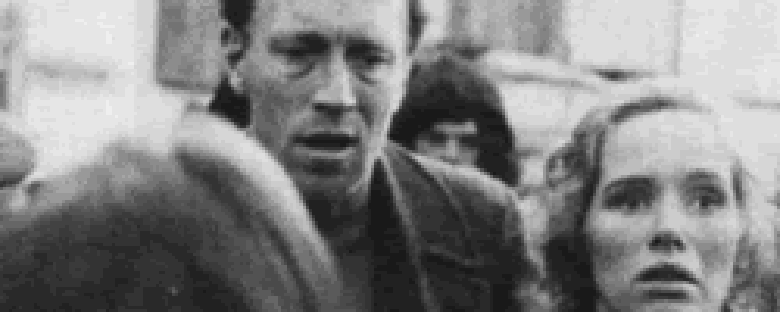Reviews
Skammen
Ingmar Bergman
Sweden, 1968
Credits
Review by Leo Goldsmith
Posted on 11 July 2004
Source MGM DVD
Where Hour of the Wolf serves as Ingmar Bergman’s most intense portrait of a character’s interior world, his next film, Shame, is among his most externalized films. In contrast to the previous two films, where Johan Borg and Elisabet Vogler physically and emotionally isolate themselves from their loved ones and from the world, the war-torn world of Shame cannot be escaped. It is a force that breaks into the lives of the protagonists, destroying their homes, severing their relationships, and depriving them of their humanity. In this way, Shame is Bergman’s bleakest film. Its protagonists, Jan and Eva, have no choice in their fate, and their dehumanization, humiliation, and defeat come not from their own fears and neuroses, but from obscure forces under which they have no control.
These obscure forces and the violent political situation they bring about are never fully explained in the film. Shame is the rare war film that empathizes not with the combatants on the front lines, but with the unwilling victims caught in between who, through their fear, weakness, or ignorance of their situation, are perpetually overlooked or carelessly exterminated.
Jan and Eva Rosenberg, like many of Bergman’s characters, are artists, former concert musicians who, in their struggle to survive in a chaotic and unpredictable situation, have given up their art to raise berries in their small greenhouse on yet another small island in the Baltic. In this environment, their talents will be wasted, as art itself becomes an insignificant reflection of a remote and idealized past, and the artifacts of that past (Lobelius’ precious Meissen figurines, Jan’s Pampini violin) are left broken in the wake of the violence. And when it is used at all, art becomes another weapon of war. The cinema is appropriated as a propaganda tool, and Eva’s interview (conducted, in a witty cameo, by I am Curious director Vilgot Sjöman) is re-dubbed into a message of support for the forces that are invading (or “liberating”) the tiny island. Thus, Jan and Eva must not only navigate the physical trials of an island under siege, they must also find their way amid the conflicting ideologies, the labels of “patriot” and “traitor” thrust upon them, and the politics of “you’re either with us or against us.”
In his previous films, Bergman established that close relationships are ultimately impossible because human beings are incapable of understanding one another. Here, it is the influence of the outside world, of a chaotic situation that intercedes in one’s life, forces one to undergo and perform terrible things, that makes human life and relations unsustainable. As Bergman sees it, life, under these terms, is no life at all. The film ends with a stalemate, with Eva, Jan, and a small boatful of refugees, adrift in a sea of bloated corpses, floating toward an uncertain future.
As grim as it is, Shame is the most passionately political film from a director who, by his own admission, is apolitical. In a 1968 interview for Swedish television, he stated: “I do not know of any party that is for frightened and terrified people who are experiencing the period of dusk and the fact that it has kind of begun and the plane is definitely inclined downwards. I cannot really engage myself in any political activity.” Nonetheless, Shame is a powerful political statement, and a deeply humanistic one, without sentimentality or banal heroics. It forcefully appeals for the “frightened and terrified people” of the world and continues to resonate with the situations in Congo, Chechnya, Afghanistan, Iraq, and Haiti.
We don’t do comments anymore, but you may contact us here or find us on Twitter or Facebook.



